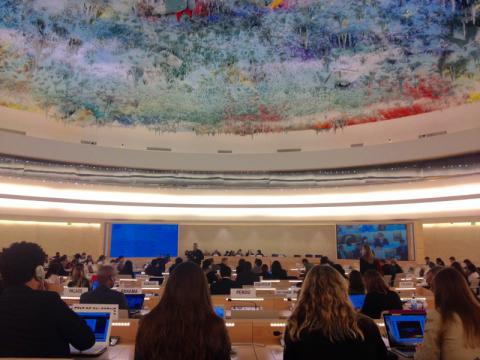
On 3 November 2015, Alkarama attended the second cycle of Mauritania's Universal Periodic Review (UPR) held at the Human Rights Council (HRC) in Geneva. Mauritania's Minister of Justice, Brahim Ould Daddah, defended their second national report before the United Nations' Member States and discussed major human rights advancements undertaken by the authorities since 2010. The Minister also answered to numerous recommendations made by several States that focused on the abolition of the death penalty and the practice of torture in detention, as well as the persistence of slavery.
Mauritania must implement the international treaties it has ratified
While many countries commended the Mauritania's efforts in its ratification process of international human rights treaties − such as the Optional Protocol (OPCAT) relating to the UN Convention against Torture (UNCAT) and the International Convention for the Protection of all Persons from Enforced Disappearances (ICPPED) − they also urged Mauritania to maintain the de facto moratorium on the death penalty in place since 1987 with a view to achieve its abolition, by ratifying the Second Optional Protocol (OP2 ICCPR) relating to the International Covenant on Civil and Political Rights (ICCPR).
Despite recent commitments made at the international level, concrete results are still lacking. In this regard, the authorities were invited to bring domestic law into line with international law. Among others, Australia indicated the lack of a definition of torture in line with Article 1 UNCAT in the country's criminal law. This legal gap makes it difficult to eradicate the practice, which is still widespread. Moreover, according to the French representative, the national protection mechanism (NPM) set up in 2012 following the ratification of the OPCAT still lacks independence. Ould Daddah responded to this by explaining that a new "independent" mechanism would soon be established as part of the new "anti- torture" legislation passed by the Parliament in August 2015.
"Slavery does no longer exist in Mauritania"
This was said by Ould Daddah in his response to States recalling that slavery remained a persistent practice. The latter responded to these criticisms by asserting that slavery had disappeared following its abolition in 1981 and its qualification as a crime against humanity in a law enacted by Parliament on 12 August 2015. The Minister of Justice preferred to talk about "recalcitrant" cases by explaining that poverty and lack of education were often the reasons behind these isolated cases. He recalled that the Government has established a roadmap for eradicating the phenomenon before 2016. According to Global Slavery Index (GSI), in 2014 Mauritania was the country the most marked by modern forms of slavery affecting no less than 4 % of the population. As he noted during the session, State agents have adequate legislation that could solve this problem. However, persecution of individuals belonging to the anti-slavery movement such as Biram Dah – President and Founder of the NGO Initiative for the Resurgence of the Abolitionist Movement (IRA) − are not conducive to optimism, especially as convictions against slavery are very rare.
Alkarama regrets that some issues were not sufficiently addressed during this second review, such as the independence of the Mauritanian National Human Rights Commission (the Mauritanian National Human Rights Institution), the inhuman detention conditions in prisons, and the authorities' failure to assure transitional justice for the numerous crimes committed against black Mauritanians between 1986 and 1991.
For more information or an interview, please contact the media team at media@alkarama.org (Dir: +41 22 734 1008).
